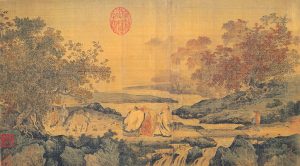The Song Dynasty (960-1279 AD) was a period in Chinese history marked by significant advancements in technology, art, and culture. One of the most important aspects of life during this time was religion. The Song Dynasty saw the rise of new religious movements, such as Neo-Confucianism, and the spread of existing ones, such as Buddhism and Daoism.
Buddhism
Buddhism was introduced to China during the Han Period (206 BC-AD 220), and during the Song Dynasty, it became one of the most popular religions in the country. Buddhism is about the teachings of the Buddha, who was born Siddhartha Gautama in present-day Nepal. He taught that life is full of suffering but that this suffering can be ended by following the Eightfold Path. This path includes living a moral life, meditating, and developing wisdom.
Buddhism became popular in China during the Song Dynasty for three reasons:
- Because many people were searching for meaning in their lives during this time of political and social upheaval.
- Because the teachings of Buddhism were seen as more applicable to everyday life than those of Confucianism.
- Because the monasteries and temples that were built for Buddhists provided a place for people to come together and socialize.
Many Buddhist temples and monasteries were built in this period. The Song Dynasty also saw the rise of Buddhist sects, such as the Pure Land and Chan (Zen) schools. Buddhism became increasingly popular among the lower classes, who were attracted to its message of equality.
Daoism
Daoism (Taoism) also flourished during the Song Dynasty. It is an indigenous Chinese religion that emphasizes harmony with nature and simple living. Daoist beliefs and practices became more widespread during the time of Emperor Huizong (reigned 1100-1125). He ordered the construction of Daoist temples and appointed Taoist teachers to high positions. In 1119, he even issued a policy that nearly destroyed Buddhism in China.
The Song Dynasty also saw the rise of new Daoist sects, such as the Quanzhen School, which is currently the predominant branch of Daoism in China. This school was founded by Wang Chongyang (1113-1170), who believed that humans could achieve immortality through self-cultivation.
Confucianism and Neo-Confucianism
Confucianism had a significant impact on the family system. This philosophy emphasized filial piety, the respect, and obedience that children were supposed to show towards their parents. Confucian teachings also placed a high value on marriage and the extended family. These ideas helped strengthen the family unit and make it the foundation of society.
Confucian teachings were also central to the civil service examination system. The exams were used to select candidates for government positions, and they tested applicants on their knowledge of the Confucian classics. As a result, many people studied these texts to prepare for exams.
In addition to the civil service exams, Confucianism also shaped the identity of the scholar-official class. This group of people held government positions but were also expected to be cultured and learned. They were often referred to as “men of letters” or “literati.” The scholar-official class saw itself as being morally superior to the rest of society, and it was this belief that helped to legitimize its power.
Confucianism had been the dominant philosophy in China for centuries, but it underwent a major revival during the Song Dynasty. Neo-Confucianism was a more rational and secular form of Confucianism that was established by the educated elite. It was based on the belief that humans are innately good and that they can perfect themselves through education and self-discipline, which will lead to a more harmonious society. Neo-Confucianism disagreed with the metaphysical aspects of Daoism and Buddhism, and it was this criticism that contributed to the conflict between these three disciplines.
Notable Neo-Confucian thinkers from this period include Zhu Xi (1130-1200), who synthesized Confucian teachings into what was later known as the Four Books, and Lu Jiuyan (1139-1192), who believed that the mind was the source of all, including the universe and the universal principle. To Lu, books were unneeded because the mind was self-sufficient. The impact of Neo-Confucianism was far-reaching and in 1241, it became the state ideology.
The Three Teachings
During the Song Dynasty, China was a country with many different belief systems. These practices were often grouped under the umbrella term “The Three Teachings.” Each of these philosophies has a different focus, but they also share some commonalities. For example, they all emphasize the importance of leading a virtuous life.
The Three Teachings were not always seen as being compatible with each other. In fact, there was often conflict between these different belief systems. This was particularly true of Confucianism and Buddhism, which had very different views on the role of the individual in society.
Confucianism focused on human relationships and the duties that people owed to each other. It was based on the premise that humans are inherently good and that they may improve themselves through learning and self-discipline. Buddhism, on the other hand, emphasized the importance of personal liberation from suffering. This meant that individuals needed to extricate themselves from worldly desires to achieve nirvana or enlightenment. Daoism was somewhere in the middle, as it focused on a person developing themselves in order to be a good example to others in the community. All of these belief systems contributed to the unique culture of the Song Dynasty.
